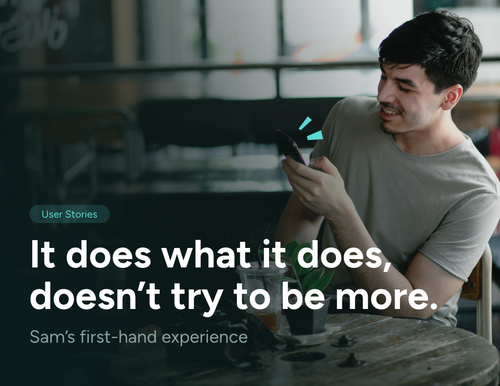OrbisPay catches up with a real-life end user of On-Demand Pay to understand how immediate access to earned wages not only helps in emergencies, but significantly improves the quality of life with more control over personal finance.
I’m sitting with one of On-Demand Pay’s most recent enrollees, Sam, a design major in Boston who has just climbed out of the job hunt pool by landing a new role at a progressive organization that offers employee benefits and perks fit for professionals of the 21st century.
It’s lunchtime and I’m on my fourth coffee, but Sam has just boujeed up a ramen. When asked how he fancies it up, he tells me, “It starts with the standard chicken-flavored ramen packet, but what I’ve been doing recently to save money, but still get all the nutrients I can, is to add a cup of rice to the ramen. Then I mix in paprika, cayenne, salt, pepper, add some veggies, and maybe crack an egg on top of all that. It comes up pretty healthy.”
We’ve all been here as broke college kids, and broke young adults, spiffing up the cheapest foods; learning to make ends meet with ketchup packets from McDonald’s. But Sam is saying sayonara to these meals because the organization that has just signed him on offers employee benefits and perks that make life a little more comfortable, and healthy.
Sam has always worked with startups and this is no exception. Startup companies are exciting and a bit unrefined. It’s fun to get your hands dirty working on startup goals. Plus, these types of companies are often quite progressive and understand the changing needs of the world and the people in it. Here, he feels connected to a mission bigger than just turning a profit.
Design and marketing has always been Sam’s focus. His skill for art has been a continuous force in communication and forging authentic connections with customers. It’s the kind of focus that speeds the development of startups. But in the last couple of years, development has slowed down for many businesses. The pandemic made a significant impact on startups and while some prevailed, many did not make it over that obstacle. As a result, Sam has been wading through the recruiting pool looking for the next organization where he can do what he loves while serving a larger purpose.
Help Wanted, but Not Hiring

Navigating the job market in the midst of pandemic, recession, and an exodus of workers leaving positions in search of better opportunities makes for a bumpy ride, even for the most experienced and skilled workers. Sam describes his experience job hunting under these conditions.
“It’s been an utter nightmare, honestly. PPP loans really did screw things up a bit for those seeking employment…, so what my experience has been over the last year of job hunting is that there are a lot of companies out there that are posting positions and saying they’re hiring, but they’re not hiring.”
PPP loans, also known as the Payment Protection Program, is a $953-billion loan program established by the US government in 2020 to aid businesses in managing the impacts and damages of COVID to business and profit. Specifically, it helps business owners to continue paying workers.
“They’re putting insane qualifications and requirements on job postings, but offering a minimum wage salary far below that of someone who meets all these strict requirements. The idea behind it is, well, fraud, basically.“
“These companies are saying, ‘hey we’re looking for employees but we’re not finding any and it’s not our fault’, and they’re getting their loans forgiven. As a result, I’ve had a lot of no-shows. Companies and recruiters are completely ghosting me on interviews and follow-ups.”
“Honestly, it’s a pain. It prolongs the search and dips into the savings in the interim. I’m glad to be done with it.”
Breaking the Pay Cycle
Tapping and stretching his savings is behind Sam now with this new role. Not only does he receive regular paychecks again, Sam can actually access his earnings whenever he needs them, no waiting for “payday”. Sam’s new employer offers workers On-Demand Pay .
“I’ve always thought of this as, you’re stuck to the paycycle. Looking for, hoping for the perfect paycycle, whether it’s weekly, biweekly, monthly. On my side, I was like, “I don’t care what it is, I need a job, I’ll make ends meet, whatever the cycle is, even if I have to struggle financially for a little while.”
But then Sam discovered the struggle isn’t real.
When he learned his new employer offers On-Demand Pay, the fears and worries of making ends meet melted away. This payroll perk certainly makes Sam’s first month on the job much smoother. He can get access to money he’s earning everyday, in order to balance the shift from one pay schedule and budget to another.
“The fact that they offered early wage access was really fascinating, actually. I was like, alright, so I don’t have to start my job worried and distracted by financial strife. I can just focus on acclimating to the job and delivering impressive results.”
Because Sam has immediate control over his pay with early access to earned wages, he doesn’t have to ask his new employer for an advance, which can be an embarrassing and stressful conversation, especially for a brand new hire. It gets the employer off the hook, too. By offering this payroll functionality to workers, employers no longer get approached by employees asking for advances, which can put a strain on a company’s payroll budget.
Another advantage to earned wage access is that employees like Sam no longer need to consider payday loans to close the gap between one paycheck and the next, especially in the event of emergencies and unforeseen circumstances.
“Yea, I definitely see this as something that kills the payday loan industry, and I mean, good riddance, honestly.”
Payday loans target vulnerable people who have very few options or don’t understand the risks. These lenders are predatory and four in five times, the loan ends up benefitting the lender, not the borrower. Payday lenders charge ultra-high interest rates, hidden fees, and penalties. Before you know it, you’re even deeper in debt than before, with an impossibly expensive additional bill.
K.I.S.S. My App
“Keep it Simple, Stupid”, or the nicer, “Keep it Super Simple” principle is hard at work in the On-Demand Pay app that Sam uses. This is a popular business principle that suggests more is not always better, and in many cases, too many frills and features can detract from the overall success and seamlessness of the app, or project, or what have you. I asked Sam about his experience using the service and the app for the first time.
“At first it was like, OOH! Shiny toy! Let me use that! But then I did use it, and it was actually very simple and useful.”
The app itself is straightforward to set up and Sam reports no challenges in getting going. There was no cost to set up, for him or his employer. Navigation is intuitive and modern, where users can always see status information, like how much money you have available for immediate access, and how many days remain until the official payday.
Sam has used a couple of apps that were somewhat similar, like Venmo, but he points out the major differences, purposes, and the fact that even tools like Venmo take a significant portion of your pie. This app, however, doesn’t have any hidden fees and it’s not out for a percentage of your wages. Instead, if you need access to money instantly, there is a small fee equivalent to that of an ATM withdrawal, and not based on the total amount being paid to the user.
When I asked what would make his app user experience better, K.I.S.S. prevailed.
“It does what it does. It doesn’t try to be more.”
“I don’t need another bank account. I don’t need extra cards, or savings accounts, or credit boosters. I just want an app I can trust, to do the one simple task of moving money where I want it, instantly. That’s all. And that’s what it does. It’s not trying to sell me anything else, or overload me with features.”
That simplicity is exactly what makes the On-Demand Pay app so perfect for so many.
One Step Closer to Financial Resilience

Offering Earned Wage Access, or On-Demand Pay to employees is a huge benefit that supports the quality of life that today’s workers strive for. An incredible 97% of full-time employees surveyed indicated that they feel the pressures of financial stress. (Purchasing Power Report, 2022)
That pressure is a critical distraction for employees, and it cuts into the quality of work that employees can deliver. Just as Sam voiced earlier, now that he has a service like On-Demand Pay to rely on, he doesn’t have to hustle so hard on the side, and now has time to devote to producing the exceptional results he was hired for.
Wages on Demand helps workers in so many ways. According to one poll, about 77% of EWA users choose to withdraw earned funds in order to pay emergency expenses like car repairs, home repairs, and food for the family. (Benefit News Research, 2021)
Sam has considered using On-Demand Pay to finally get the new cell phone he desperately needs to stay in touch with long-distance loved ones, and to make himself available to colleagues when they need his input.
When I ask Sam about other important uses for EWA, he responds jokingly, “I use it to show-off and impress my friends -- Look what I can do!”

But joking aside, another serious expense Sam is expecting is travel.
“I’m going to see my family in California for the first time in a long time. Ticket prices are really getting expensive and the longer I wait the more it costs. I could wait, and buy my ticket at the last minute; paying 3x as much, or I can access some of my earned wages and buy a ticket now and save. It’s definitely an added security benefit to know On-Demand Pay has my back for holiday travel.”
Whether your expenses are a surprise, like a sudden need for a water pump in your vehicle, or whether they aren’t so dramatic, like picking up an extra bag of post-holiday candies to enjoy in the coming weeks, access to the money you’ve already earned is quite a powerful tool in the arsenal of financial resilience that allows for a higher quality of life.
“At the very least, I know I won’t have to eat ramen for the rest of the month.”

